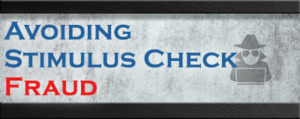April 1, 2020
 The Internal Revenue Service (IRS) is warning Americans about the potential for fraud related to the stimulus checks that many of us will receive in the coming weeks. Just like with other cyber-crimes related to COVID-19, scammers are using the panic and confusion surrounding the virus (and the stimulus bill) to take advantage of many unsuspecting people. Scammers are using the following tactics to gain access to people’s finances:
The Internal Revenue Service (IRS) is warning Americans about the potential for fraud related to the stimulus checks that many of us will receive in the coming weeks. Just like with other cyber-crimes related to COVID-19, scammers are using the panic and confusion surrounding the virus (and the stimulus bill) to take advantage of many unsuspecting people. Scammers are using the following tactics to gain access to people’s finances:
- Calling, texting or emailing to “verify” filing information. Criminals are pretending to verify your personal information to ensure you receive your stimulus check in a timely manner. In reality, they are gathering your information to use in fraudulent activity. The IRS will not call and ask you to verify your payment details. Do not respond to calls, emails or texts requesting your bank account, debit account, or PayPal account information—even if someone claims it’s necessary to get your stimulus check.
- Calling, texting or emailing claiming to be able to get your check to you faster, or claiming to be able to get you MORE money from the government. They will likely ask you to provide personal information and a small “processing fee.” This is a scam. You do not have to send the government money to get your check and there is not a magic link you can click to make your check arrive more quickly. You should never click on a link if you are not positive that it is coming from a legitimate source.
- Printing and mailing fake stimulus checks. It will take the U.S. Treasury Department at least a few weeks to mail paper checks—if you’ve already received a check in the mail, it is fraudulent. The IRS has released information about what amount qualifying Americans will receive. If you receive a check in an amount different than what you are expecting, or a check that has cents, it is fraudulent. In addition, any check that you receive that requires you to verify it online or by phone is fraudulent.
